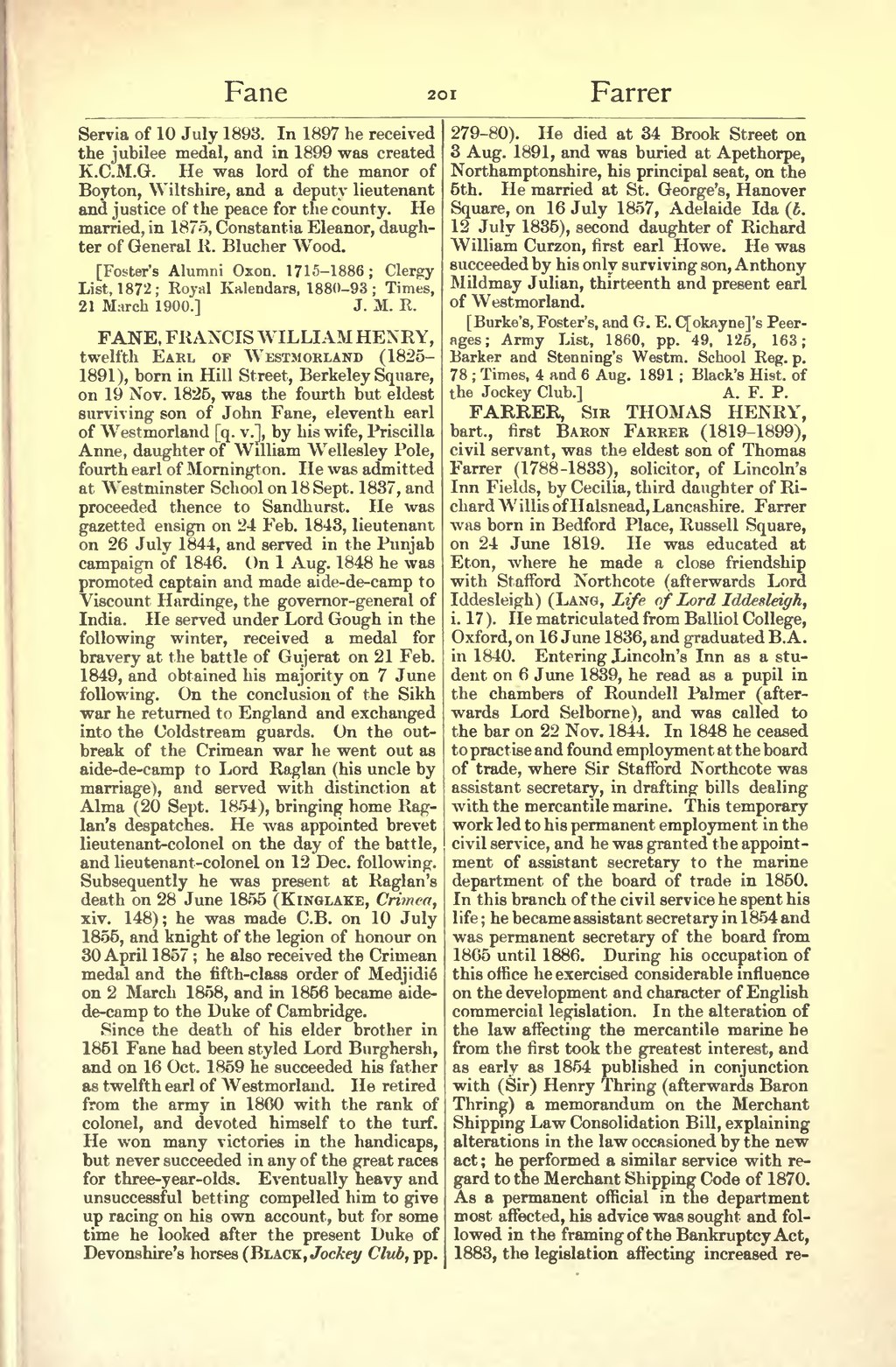Servia of 10 July 1893. In 1897 he received the jubilee medal, and in 1899 was created K.C.M.G. He was lord of the manor of Boyton, Wiltshire, and a deputy lieutenant and justice of the peace for the county. He married, in 1875, Constantia Eleanor, daughter of General R. Blucher Wood.
[Foster's Alumni Oxon. 1715–1886; Clergy List, 1872; Royal Kalendars, 1880–93; Times, 21 March 1900.]
FANE, FRANCIS WILLIAM HENRY, twelfth Earl of Westmorland (1825–1891), born in Hill Street, Berkeley Square, on 19 Nov. 1825, was the fourth but eldest surviving son of John Fane, eleventh earl of Westmorland [q. v.], by his wife, Priscilla Anne, daughter of William Wellesley Pole, fourth earl of Mornington. He was admitted at Westminster School on 18 Sept. 1837, and proceeded thence to Sandhurst. He was gazetted ensign on 24 Feb. 1843, lieutenant on 26 July 1844, and served in the Punjab campaign of 1846. On 1 Aug. 1848 he was promoted captain and made aide-de-camp to Viscount Hardinge, the governor-general of India. He served under Lord Gough in the following winter, received a medal for bravery at the battle of Gujerat on 21 Feb. 1849, and obtained his majority on 7 June following. On the conclusion of the Sikh war he returned to England and exchanged into the Coldstream guards. On the outbreak of the Crimean war he went out as aide-de-camp to Lord Raglan (his uncle by marriage), and served with distinction at Alma (20 Sept. 1854), bringing home Raglan's despatches. He was appointed brevet lieutenant-colonel on the day of the battle, and lieutenant-colonel on 12 Dec. following. Subsequently he was present at Raglan's death on 28 June 1855 (Kinglake, Crimea, xiv. 148); he was made C.B. on 10 July 1855, and knight of the legion of honour on 30 April 1857; he also received the Crimean medal and the fifth-class order of Medjidié on 2 March 1858, and in 1856 became aide-de-camp to the Duke of Cambridge.
Since the death of his elder brother in 1851 Fane had been styled Lord Burghersh, and on 16 Oct. 1859 he succeeded his father as twelfth earl of Westmorland. He retired from the army in 1860 with the rank of colonel, and devoted himself to the turf. He won many victories in the handicaps, but never succeeded in any of the great races for three-year-olds. Eventually heavy and unsuccessful betting compelled him to give up racing on his own account, but for some time he looked after the present Duke of Devonshire's horses (Black, Jockey Club, pp. 279-80). He died at 34 Brook Street on 3 Aug. 1891, and was buried at Apethorpe, Northamptonshire, his principal seat, on the 5th. He married at St. George's, Hanover Square, on 16 July 1857, Adelaide Ida (b. 12 July 1835), second daughter of Richard William Curzon, first earl Howe. He was succeeded by his only surviving son, Anthony Mildmay Julian, thirteenth and present earl of Westmorland.
[Burke's, Foster's, and G. E. C[okayne]'s Peerages; Army List, 1860, pp. 49, 125, 163; Barker and Stenning's Westm. School Reg. p. 78; Times, 4 and 6 Aug. 1891; Black's Hist. of the Jockey Club.]
FARRER, SIR THOMAS HENRY, bart., first Baron Farrer (1819–1899), civil servant, was the eldest son of Thomas Farrer (1788–1833), solicitor, of Lincoln's Inn Fields, by Cecilia, third daughter of Richard Willis of Halsnead, Lancashire. Farrer was born in Bedford Place, Russell Square, on 24 June 1819. He was educated at Eton, where he made a close friendship with Stafford Northcote (afterwards Lord Iddesleigh) (Lang, Life of Lord Iddesleigh, i. 17). He matriculated from Balliol College, Oxford, on 16 June 1836, and graduated B.A. in 1840. Entering Lincoln's Inn as a student on 6 June 1839, he read as a pupil in the chambers of Roundell Palmer (afterwards Lord Selborne), and was called to the bar on 22 Nov. 1844. In 1848 he ceased to practise and found employment at the board of trade, where Sir Stafford Northcote was assistant secretary, in drafting bills dealing with the mercantile marine. This temporary work led to his permanent employment in the civil service, and he was granted the appointment of assistant secretary to the marine department of the board of trade in 1850. In this branch of the civil service he spent his life; he became assistant secretary in 1854 and was permanent secretary of the board from 1865 until 1886. During his occupation of this office he exercised considerable influence on the development and character of English commercial legislation. In the alteration of the law affecting the mercantile marine he from the first took the greatest interest, and as early as 1854 published in conjunction with (Sir) Henry Thring (afterwards Baron Thring) a memorandum on the Merchant Shipping Law Consolidation Bill, explaining alterations in the law occasioned by the new act; he performed a similar service with regard to the Merchant Shipping Code of 1870. As a permanent official in the department most affected, his advice was sought and followed in the framing of the Bankruptcy Act, 1883, the legislation affecting increased re-
